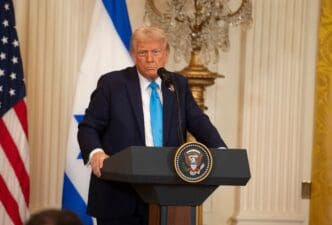Executive Summary
The Story So Far
Why This Matters
Who Thinks What?
President Donald Trump declared a breakthrough in Gaza peace efforts on Friday, claiming victory after Hamas responded to his 20-point ceasefire proposal. Despite Hamas’s reply falling short of a full endorsement of key demands, Trump quickly embraced the statement, focusing on the group’s readiness to release all remaining hostages and publicly urging Israel to halt its bombardment of Gaza, a move that appeared to preempt an Israeli response and pressured Prime Minister Benjamin Netanyahu.
Trump’s Swift Endorsement
Upon receiving Hamas’s response after nearly five days, White House officials quickly shared the statement, at one point mistakenly attributing it to Trump. While Hamas did not fully endorse critical points such as disarming or relinquishing future governance of Gaza, Trump chose to highlight the group’s agreement to release all remaining hostages held since the October 7, 2023, attacks. He expressed readiness to proceed as if peace was imminent, despite remaining uncertainties.
Only an hour after Hamas released its six-paragraph reply, Trump posted on Truth Social, stating, “Based on the Statement just issued by Hamas, I believe they are ready for a lasting PEACE.” He added, “Israel must immediately stop the bombing of Gaza, so that we can get the Hostages out safely and quickly!” This intervention preempted any immediate response from Israel, which Trump and his team had been pressing to accept the plan earlier in the week.
Netanyahu’s Position and Israeli Reaction
In a statement early Saturday, Prime Minister Netanyahu’s office indicated that “Israel is preparing to immediately implement the first phase of Trump’s plan for the immediate release of all hostages.” The statement affirmed continued cooperation with President Trump’s team to end the war, consistent with Israeli principles and Trump’s vision. However, it did not directly address Trump’s demand for an immediate halt to bombing.
An Israeli source indicated that Trump’s celebration of Hamas’s response, particularly his order for Israel to immediately stop bombing Gaza, surprised Netanyahu. This demand reportedly forced Israel to halt its assault on Gaza City, despite preparations to conduct renewed negotiations under continued military pressure. Neither the prime minister’s office nor the Israel Defense Forces publicly addressed Trump’s demand for a bombing halt or provided a timeline for hostage release.
Diplomatic Efforts and Skepticism
In a video posted to Truth Social Friday night, Trump called it a “big day,” emphasizing that “Everybody was unified in wanting this war to end and seeing peace in the Middle East, and we’re very close to achieving that.” He personally thanked Qatar, Turkey, Saudi Arabia, Egypt, and Jordan for their efforts in brokering peace, notably omitting any mention of Netanyahu.
US officials, including Trump’s special envoy Steve Witkoff and Jared Kushner, are scheduled to travel to Egypt for negotiations on the details of the hostage release and other aspects of the peace plan. However, not all allies shared Trump’s optimism. Senator Lindsey Graham described Hamas’s response as a “classic ‘Yes, but,’” pointing to conditions like no disarmament and tying hostage release to negotiations, which he viewed as a rejection of Trump’s “take it or leave it” proposal.
Trump acknowledged that work remained to finalize the arrangement, stating, “We’ll see how it all turns out. We have to get the final word down in concrete.”
Background to the Proposal
Communication challenges with Hamas’s military leaders in Gaza and divisions within Hamas leadership over certain plan elements contributed to the delay in their response. Trump, growing impatient, issued a Sunday night ultimatum on Friday morning, threatening “all hell” in Gaza if Hamas did not agree.
The response, despite its caveats, provided Trump an opportunity to declare progress rather than green-light an escalation, thereby placing Netanyahu in a difficult position. Trump has had an increasingly strained relationship with Netanyahu since reentering office in January, with frequent tense phone calls concerning the duration of the Gaza war and Israel’s broader expansion of the conflict, which some sources suggest could impact Trump’s aspirations for a Nobel Peace Prize.
A catalyst for the multipoint plan was reportedly Israeli strikes in Qatar last month targeting Hamas leaders, which Trump and US officials viewed as destabilizing to peace efforts. Trump aides, including Witkoff and Kushner, worked to secure Netanyahu’s buy-in to the proposal in New York, warning that continued US support for Israel could be at risk without his agreement. After hours of discussion and some revisions to the plan’s wording, Netanyahu eventually agreed. As part of their meeting, Netanyahu reportedly telephoned Qatar’s prime minister to apologize for the strikes, a move seen as crucial for advancing negotiations.
Next Steps
As negotiations are set to continue in Egypt, Trump’s swift declaration of progress and direct demand for a halt to Israeli operations have significantly shifted the dynamics, placing immediate pressure on Israel to de-escalate and move towards a resolution, even as key details of the ceasefire remain unresolved.








